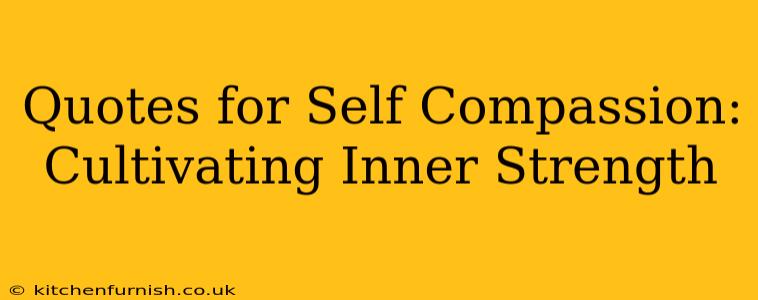Self-compassion, the act of treating yourself with the same kindness, concern, and understanding you'd offer a dear friend, is a powerful tool for cultivating inner strength and resilience. It's not about self-indulgence or weakness; it's about recognizing your inherent worthiness and nurturing your well-being. This journey involves acknowledging your imperfections, embracing vulnerability, and offering yourself the same grace and forgiveness you readily extend to others. This post explores the profound impact of self-compassion, offering insightful quotes to inspire your journey toward inner strength.
What is Self-Compassion?
Before delving into inspiring quotes, let's clarify what self-compassion truly entails. It's a multifaceted practice comprising three core components:
- Self-kindness: Treating yourself with warmth, understanding, and acceptance, especially during times of suffering. This involves replacing self-criticism with self-soothing.
- Common humanity: Recognizing that suffering and imperfection are part of the shared human experience. You're not alone in your struggles.
- Mindfulness: Observing your thoughts and feelings without judgment. This helps to prevent emotional overreaction and promotes a balanced perspective.
Inspiring Quotes on Self-Compassion
These quotes offer a glimpse into the transformative power of self-compassion, highlighting its role in building resilience and fostering inner peace.
"Treat yourself like someone you are responsible for helping." – Stephen Covey This quote beautifully illustrates the essence of self-compassion: taking proactive care of your emotional and mental well-being.
"Self-compassion is not self-indulgence; it's self-acceptance." – Unknown This clarifies the often-misunderstood difference. Self-compassion is not about rewarding negative behavior; it's about accepting your flaws and offering yourself support.
"The greatest glory in living lies not in never falling, but in rising every time we fall." – Nelson Mandela This quote, while not explicitly about self-compassion, speaks to the resilience it fosters. Self-compassion allows you to learn from mistakes without dwelling on self-criticism, enabling you to rise stronger.
"You yourself, as much as anybody in the entire universe, deserve your love and affection." – Buddha This timeless message underscores the fundamental truth of your inherent worthiness.
How to Cultivate Self-Compassion
Self-compassion isn't a passive trait; it's an actively cultivated skill. Here are some practical steps to integrate self-compassion into your daily life:
- Practice mindfulness: Pay attention to your thoughts and feelings without judgment. Notice when you're being self-critical and gently redirect your thoughts towards self-kindness.
- Challenge negative self-talk: Identify and actively challenge those critical inner voices. Replace negative thoughts with compassionate and encouraging ones.
- Engage in self-soothing activities: Identify activities that bring you comfort and joy – reading, spending time in nature, listening to music, etc. Engage in these activities when you're feeling down.
- Practice forgiveness: Learn to forgive yourself for past mistakes. Holding onto guilt and shame only hinders your growth.
- Connect with others: Sharing your struggles with trusted friends or family can provide emotional support and validation.
Frequently Asked Questions (FAQs)
Is self-compassion selfish?
No, self-compassion is not selfish. It's about recognizing your own value and needs. Just like you wouldn't expect to help others effectively if you were exhausted and depleted, prioritizing your well-being through self-compassion is essential for being able to effectively care for others.
How is self-compassion different from self-esteem?
Self-esteem is generally considered to be a judgment of your overall worth, while self-compassion is a response to suffering. You can have low self-esteem and still practice self-compassion. Self-compassion doesn't require you to believe you're inherently "good" or "worthy"; it simply acknowledges that you are human, and your struggles are part of the shared human experience.
Can self-compassion help with anxiety and depression?
Research suggests that self-compassion can be a valuable tool in managing anxiety and depression. By reducing self-criticism and increasing self-acceptance, self-compassion can help alleviate emotional distress and promote psychological well-being. It’s vital to remember that self-compassion is a supplement to and not a replacement for professional mental health care when needed.
Conclusion
Self-compassion is not a luxury; it's a fundamental aspect of mental and emotional well-being. By nurturing self-kindness, common humanity, and mindfulness, you cultivate inner strength, resilience, and a deeper sense of self-acceptance. The journey towards self-compassion is a continuous process, but the rewards—a more peaceful, fulfilling, and empowered life—are immeasurable. Embrace the journey, and remember, you are worthy of your own kindness.

